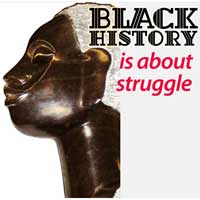Pan-Africanism and Palestine solidarity
History of an anti-imperialist struggle
By
Abayomi Azikiwe
Editor, Pan-African News Wire
Published Feb 4, 2009 2:29 PM
Following are excerpts from a talk presented in Detroit Jan. 31 at a
Michigan Emergency Committee Against War & Injustice forum entitled
“African-Americans Speak Out for Palestine.” Go to
panafricannews.blogspot.com to read Azikiwe’s entire talk.
Beginning with the conclusion of the 19th century, the world Zionist movement
has been allied with the system of Western imperialism. This phenomenon did
coincide with the consolidation of colonial rule in Africa and
institutionalized segregation in the United States. Consequently, the struggle
against Jim Crow and apartheid and for genuine national liberation of oppressed
peoples in Africa and the United States would inevitably clash with efforts
geared toward the building of support for the State of Israel as well as
Zionist political aims and objectives.
According to Ismael Zayid in his 1980 study entitled “Zionism: The Myth
and the Reality,” “Zionism, as a modern political creed, emanated
in Europe, as a recognizable political ideology, at the end of the nineteenth
century with three main inherent and fundamental qualities. They are namely
settler colonialism, racism and expansion.”
The most well-known connection between the world Zionist movement and European
colonialism and apartheid took place in the former colonies of Rhodesia and
South Africa. According to Zayid, “From its inception, the Zionist
movement saw a natural systematic alliance with European imperialism. The rapid
advances of aggressive and chauvinist nationalism in Europe stressed that the
superior racial qualities were the basis for the exploitation and
‘civilizational mission,’ under the notion of the ‘white
man’s burden.’”
Throughout the negotiations involving the Zionist proposals for white
penetration into Africa and Asia, [Theodore] Herzl, in the manner of 19th
century imperialist thinkers, spoke of imperialism and colonization as a
“noble activity destined to bring civilization to the ‘backward
races.’” Viewing the Jewish state with occidental white binoculars,
he asserted that this state is designed to “form a part of a wall of
defense for Europe in Asia, an outpost of civilization against
barbarism.”
African territories were strongly considered as a “homeland” for
the Zionist state. This contradicts the proclaimed scriptural basis for the
colonization of Palestine. Zayid states that “In their search for a
location for the Zionist enclave, to be created, a variety of options were
explored including Uganda (east Africa), Tripolitania in Libya (north Africa),
Cyprus (Mediterranean), Madagascar (off the southeast African coast), Congo (in
central Africa) and Palestine.”
Joseph Chamberlain, the British racist theoretician, told Herzl that “I
have seen a land for you on my recent travels, and that is Uganda. It is not on
the coast but the climate of the interior is excellent for Europeans.”
Though Herzl strongly favored Uganda as the location for the Jewish state, the
committee appointed by the World Zionist Congress to explore the area found it
unsuitable.
During the period of World War I, Lord Balfour issued his declaration on Nov.
2, 1917, which was utilized as the legal basis for Zionist settlement and the
eventual creation of the State of Israel in 1948.
Zayid wrote also that “Herzl’s efforts in England included
soliciting the backing of major colonialist figures, foremost amongst whom was
Cecil Rhodes, the founder of the British colonial outpost in Rhodesia during
the late 19th century.”
By 1948, with the creation of the State of Israel and despite the virulent
anti-Semitic ideology of the Afrikaner Nationalist Party, which came to power
in the Union of South Africa that same year, the party shifted its position
strongly in favor of Israel. It also changed its views in support of Jewish
community interests in South Africa.
According to Richard P. Stevens in his study on the Afrikaner-Israel link, as
it related to the apartheid system, “Not only did it perceive the
necessity of white solidarity if a minority racial regime were to be
maintained. Also Dr. Edwin S. Munger, a long-time observer of the South African
scene, saw the post-war Jewish-Afrikaners rapprochement was also due to the
feeling of highly influential Afrikaners that ‘the elimination of Jews
from South Africa would shake the country to its foundation since it would lead
to the withdrawal by wealthy Jews of sufficient capital to precipitate an
economic slump.’”
All during the period of apartheid in South Africa, the State of Israel was a
staunch supporter of the racist state. Consequently, and particularly after the
1967 so-called six-day war, the African National Congress, the liberation
movement in South Africa, and the Southwest African Peoples’
Organization, in addition to other liberation movements in Zimbabwe,
Mozambique, Angola, Guinea-Bissau, as well as independent Algeria, were staunch
supporters of the Palestinian national liberation struggle.
This alliance between the national liberation struggle in Africa and the
Palestinian and other struggles for independence and self-determination in the
Arab world continues today in the aftermath of apartheid and the independence
of the former colonial nations of Africa. One of the strongest Palestinian
support movements exists today in South Africa.
During the World Conference against Racism in 2001 in Durban, South Africa, the
United States government, under the Bush administration, attempted to sabotage
the international gathering because it allowed the Palestinians equal rights of
expression and participation. Other issues as well, including reparations for
slavery and the right of self-determination for Indigenous peoples, drew the
ire of the United States administration.
Articles copyright 1995-2012 Workers World.
Verbatim copying and distribution of this entire article is permitted in any medium without royalty provided this notice is preserved.
Workers World, 55 W. 17 St., NY, NY 10011
Email:
[email protected]
Subscribe
[email protected]
Support independent news
DONATE


